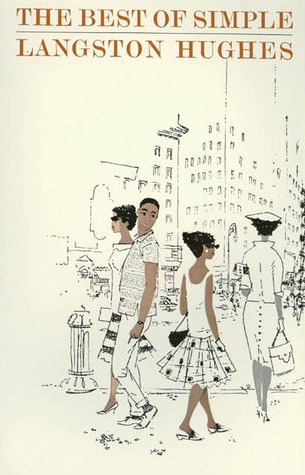
SmokeLong‘s “Flash, Back” series asks writers to discuss flash fiction that may be obscure or printed before the term “flash fiction” became popular, and tell us how these older or not widely-known works are meaningful. In this edition, Bernard James shares the insight and humor of Langston Hughes’ character, Jesse B. Semple. Submit your own “Flash, Back” or other flash-related essays on our Submittable page!
By Bernard James
The indomitable spirit of Jesse B. Semple (aka “Simple”) was first introduced by Langston Hughes in 1943, through a series of stories that appeared in a column he wrote for the Chicago Defender. Simple’s legacy as a literary fixture was later cemented following the release of three compilations that made Hughes’ original content available for wider public consumption. The first was Simple Speaks His Mind, published in 1950, followed by Simple Takes a Wife in 1953 and Simple Stakes a Claim, released in 1957. Subsequent anthologies (The Best of Simple, 1961, Simple’s Uncle Sam, 1965 and The Return of Simple, 1994) sample from the earlier pieces to form new collections, but the charisma that is Simple and the grace with which Hughes delivers him to the page are no less impactful when viewed through this updated, curatorial lens.
Each story is presented as a conversation that opens a window onto the beauty of pedestrian encounters. Indeed, part of what makes them so beautiful is the ongoing discovery that Simple’s life (our lives) are not pedestrian at all. “Simple on Indian Blood,” “Simple Prays a Prayer,” “Temptation,” “Vacation,” “Letting off Steam…” The titles are succinct, the prose direct and easy to understand. Through Simple, Hughes elevates the ordinary and shines a spotlight on what is otherwise common. Simple becomes a metaphor for profound statements exploding from unassuming packages. Hughes’ abbreviated prose cuts to the chase and by intensifying the mood, brings his subjects into better focus.
In “Simple Prays a Prayer,” the protagonist carries on about how whites would not recognize Christ if he returned at that moment; that they would barricade their segregated churches and sink deeper into their pious, segregated selves. Simple hopes that when Christ does return, he lands in the South and brings anger and vengeance with him. Notably, Simples hopes that “Christ drives the Jim Crowers out of their high places, every living last one of them, from Washington to Texas!” concluding his rant with “I hope he smites white folks down.” When Hughes asks if Simple is referring to all white folks, Simple replies, “No, I hope he lets Mrs. Roosevelt alone.” ntentional, but discerning. Humorous, but righteous still.
In “Conversation on the Corner,” Hughes and Simple talk about everything from haircuts to gambling, drinking, and dancing. Simple claims he drinks because he is lonesome, but the author shoots this down, questioning how Simple could possibly be lonesome given his popularity and the many friends at his disposal. “I’m lonesome inside myself,” Simple explains. Yes…this line grabs at me too; and I keep going back to it, turning it over in my mind. Relating and understanding. Unflinching in his delivery, Hughes understates it like a whisper that pulls you in closer until it squeezes your soul with devastating veracity. Alone in one’s own head is sometimes a challenging place to be. Anxiety. Insecurity. Depression. Hughes plainly speaks the truth of this.
Simple manifests as an amalgamation of identities. He is everyone and no one, yet accessible to anyone. He is available to the masses—and as a technical construct, these conversational vignettes serve up bite-sized portions of commentary and introspection through which the reader comes to invest in Simple’s foibles and concerns. Simple’s observations as presented by Hughes are analogous to holding up a mirror on a typical day, reflecting its typical problems and potential (typical) resolutions.
Simple’s longtime lady friend Joyce figures prominently in his many discussions with Hughes. She is patient to a fault, and forgiving of Simple’s assortment of less than perfect traits. But we soon learn that Joyce has her limits, and when Simple really screws things up, even Joyce no longer finds him tolerable. In “Blue Evening,” Hughes finds Simple sitting on the corner stool alone. He mistakes his friend’s malaise as the manifestation of another hangover, but Simple explains that Joyce has finally quit him. When Hughes offers a drink to cheer him up, the author is blindsided by another surprise. “This is one time I do not want a drink. I feel too bad,” Simple says, and Hughes knows his friend is in serious trouble.
Simple pleads his case, but Joyce is not persuaded. He rings her bell, sends telegrams—phones her seventeen times in a row; and still she will not answer. “You never miss the water till the well runs dry,” Simple concedes. At that moment, he cares about nothing other than winning back Joyce’s affections. Liquor and other women are of no concern; the distaste he harbors for his landlady is of no concern; even race relations and Jim Crowers do not bother him in the face of this unexpected loss. “I would not care if Mississippi moved to Times Square,” he proclaims, which is something, because Simple is fiercely protective of New York and especially the (black) safe haven that Harlem provides. Having drifted beyond the point where Hughes’ explanations carry any weight, Simple has resolved to stand outside Joyce’s brownstone all night, pleading his case and calling her name if that is what it takes. Who among us has not experienced the pain of love lost and the desperation to get it back? That is a condition understood by everyone, escapable by no one, and applicable to anyone.
Novels have longer arcs; slower deliveries. Reading one is like taking a long train ride or a cross country trip. By contrast, Simple’s reflections feel more like a walk home from the corner grocery store—with a random stop on a friend’s porch or a quick detour inside the neighborhood bar to catch up on gossip over a couple of drinks. In Hughes’ capable hands, a profusion of action transpires inside these discrete windows in time. This is a testament to the author’s talents and the beauty of the sensory context established through repeated dialogue with Jesse B.
The Simple Shorts (as I like to call them) functioned as a kind of gateway; priming and preparing me for denser volumes that were yet to come. Flawed and irreverent though he was, here was this likable, accessible character who was plainspoken but substantive in discourse and thought. As fictionalized trough Hughes’ sensibilities, Simple opines on weighty matters of the day, striking a prescient chord as it relates to our current state of racial and economic affairs. But unlike the solemn to somber tone found in some of Hughes’ poetry (A Negro Speaks of Rivers, Kids Who Die, and Suicide’s Note for example), Hughes successfully reaches for a more buoyant plane of expression through the humorous and dubious rationalizations of Simple.
Having grown up in the decaying orbit of Youngstown’s once vibrant steel industry, I was several imaginations removed from the cultural consciousness that permeated Langston Hughes’ Harlem. Nowhere was that more evident than in the mostly Eurocentric curriculum to which I was subjected during my primary and secondary education. But my lovely mother, God rest her soul, was my saving grace. She stepped into the breach, exerted her influence and remedied this lack of exposure. An avid reader with a special appreciation for the canon of Black American classics, she made sure I was introduced to—amon others—Morrison, Hurston, Ellison and Hughes. More than any other, it was Langston Hughes who captured my imagination and fueled my desire to further acquaint myself with Harlem’s renaissance period; and it was Jesse B. Semple who stood out as one of the most significant influences on a young boy’s immersion into the world of black language arts.
Jesse B. Semple was a purveyor of flash long before such a notion had settled into common understanding. Hughes’ capacity for lyricism and his ability to unpack, then distill complex ideas uniquely positioned him to take full command of the short story form. By reducing the framework of each story to a brief conversation with Simple, Hughes imbues the narrative with additional powers, enabling it to punch above its weight. He sets us up to expect and wait for Simple’s gems. Each story is uniquely capable of standing on its own, encapsulating and resolving itself from brief beginning to end; but when taken together, the reader is lulled into a comfortable pattern of elongated time and space; each story building upon the one that came before it and in turn, setting the stage for the next in line. Hughes’ voice and the folksy appeal of Jesse B. Semple are what allow this magic to unfold—from story to story, in the space between collections, and in the reflective silence that follows, long after Simple’s tales have been told.
 Writing under the pseudonym Bernard James, James Bernard Short is an emerging novelist, essayist, and poet. His singular ambition as a writer is to produce smart, expressive and culturally authentic content that captures the wide spectrum of aspirations and challenges encountered by persons of color. Notions of what define the cultural and geographic boundaries of the Black diaspora are of particular interest, as well as pieces that explore the dynamics of love, loss and personal transition. James’ work has appeared in sx salon, a Small Axe literary platform, the Killens Review of Arts & Letters, and the Columbia Journal of Literature and Art. He is a 2016 Kimbilio Fellow, a member of the 2016 Writer’s Hotel Master Class in Poetry, a 2015 Givens Writing Fellow, and a participant in the 2013 MN Northwoods Writer’s Fiction Workshop. James holds degrees from Northwestern and The University of St. Thomas. He currently resides in the Twin Cities.
Writing under the pseudonym Bernard James, James Bernard Short is an emerging novelist, essayist, and poet. His singular ambition as a writer is to produce smart, expressive and culturally authentic content that captures the wide spectrum of aspirations and challenges encountered by persons of color. Notions of what define the cultural and geographic boundaries of the Black diaspora are of particular interest, as well as pieces that explore the dynamics of love, loss and personal transition. James’ work has appeared in sx salon, a Small Axe literary platform, the Killens Review of Arts & Letters, and the Columbia Journal of Literature and Art. He is a 2016 Kimbilio Fellow, a member of the 2016 Writer’s Hotel Master Class in Poetry, a 2015 Givens Writing Fellow, and a participant in the 2013 MN Northwoods Writer’s Fiction Workshop. James holds degrees from Northwestern and The University of St. Thomas. He currently resides in the Twin Cities.

 The SmokeLong Grand Micro Contest (The Mikey) is now an annual competition celebrating and compensating the best micro fiction and nonfiction online.
The SmokeLong Grand Micro Contest (The Mikey) is now an annual competition celebrating and compensating the best micro fiction and nonfiction online.